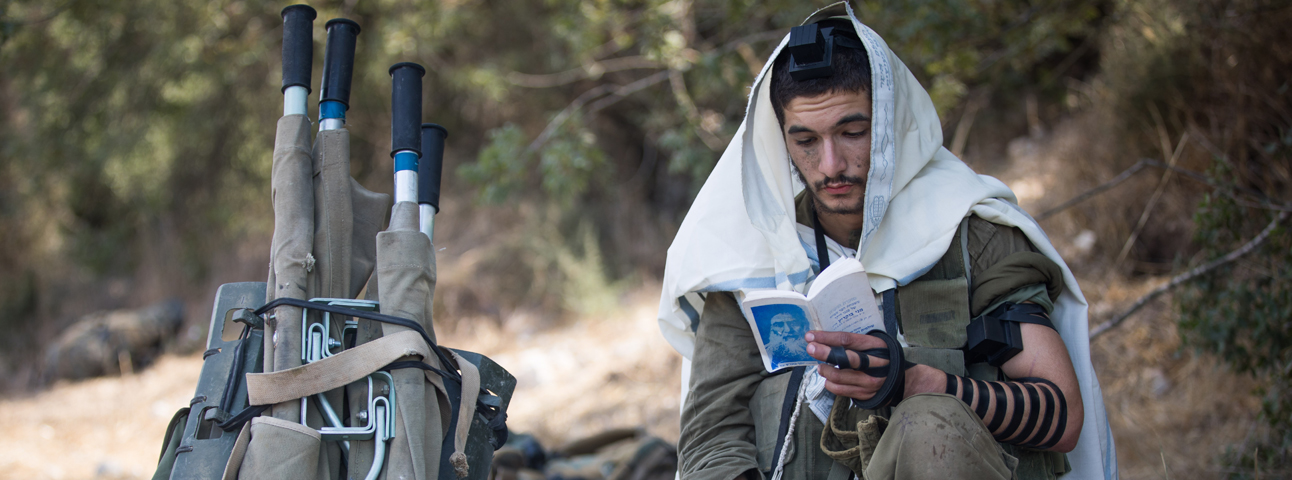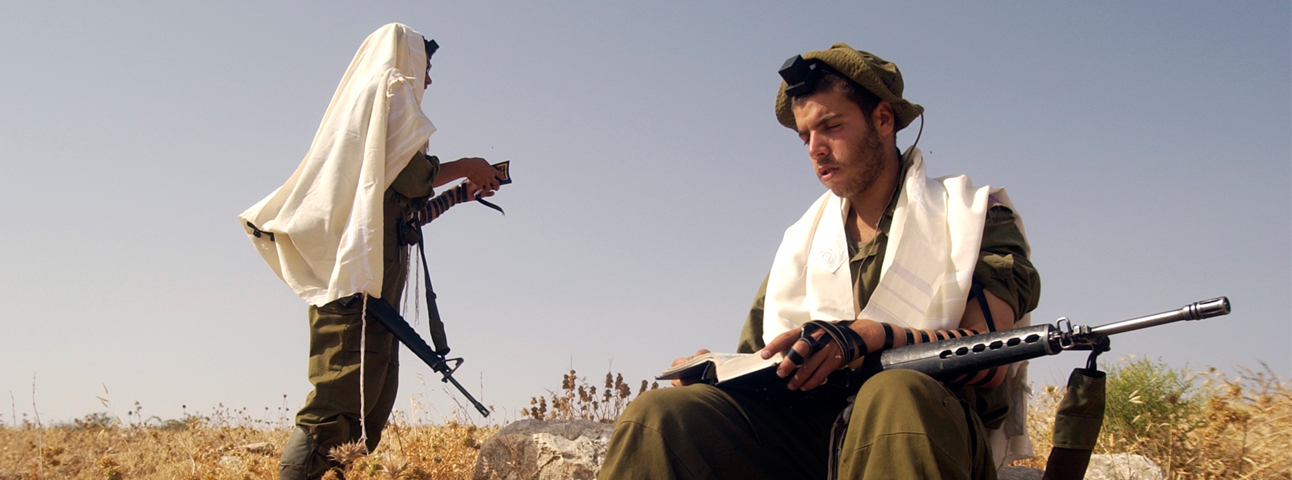Citizenship and Military Service in Ultra-Orthodox Society
More and more ultra-Orthodox (Haredi) Israelis are enlisting in the IDF, driven by personal, financial, and professional motives, with military service seen as an “entrance ticket” to Israeli society and to the labor market. But military service also introduces them to the shared components of identity and citizenship linking them to the state and its values, and enabling them to identify with others, from outside their community.

Illustration | Flash 90
Israeli civic identity is closely linked to Jewish nationality. Despite the state’s ostensible extension of equal citizenship to all its residents, both Jewish and non-Jewish, in practice-- the Israeli civic arena is clearly dominated by the Jewish majority (Peled and Shafir, 2005). This tension, between the ideal of equality and the reality of the preferential status of the Jewish nation in the State of Israel, has led to institutionalized discrimination against the country’s non-Jewish minorities. On the one hand, Israel is completely inclusive in its attitude toward Jewish immigrants (see the Law of Return); while on the other, it discriminates against non-Jewish citizens, including Arab citizens of Israel, non-Jewish immigrants from the Former Soviet Union, and other ethnic groups, such as Ethiopian-Israelis. The most important criterion for assessing Israelis’ civic status and the extent of their contribution to Israeli society has always been (and remains) military service. Military service—and especially service in combat units—grants an individual top status on Israel’s informal social hierarchy.
Thus, in many respects—social, civil, and ethical—the issue of ultra-Orthodox military service poses a highly significant social and political challenge and is a significant component in Israel’s social and political rifts. The arrangement under which ultra-Orthodox men can defer enlistment by declaring Torah study to be their “occupation,” is one of the most contentious subjects of public debate in Israel, especially in the context of the obligation to “share the burden” of military service. Periodically, the question of ultra-Orthodox enlistment reaches a crisis point, followed by an interval of relative calm, until the next round of wrangling and bickering, which again reaches no conclusion—political, legal, or social—as to the proper balance between the obligation of military service in Israel and the value of Torah study in ultra-Orthodox society.
For the ultra-Orthodox community, military service is seen as an affirmation and justification of the secular Zionist state, which ultra-Orthodox leadership still opposes, whether openly or more latently. Additionally, and no less importantly, military service is seen as one of the most obvious threats to the ultra-Orthodox way of life. Service takes place in a social setting that is essentially secular and permissive, and not under the control of the ultra-Orthodox rabbis who have carefully nurtured the ultra-Orthodox “society of Torah scholars” since the 1950s, and worked to inculcate full-time Torah study as the ideal model for all ultra-Orthodox men (Friedman, 1991). And so, opposition to military service is another brick in the wall insulating the ultra-Orthodox community from modern, Western culture.
Thus, as a matter of principle, the ultra-Orthodox stance toward the state and towards military service is confrontational and instrumentalist, and based on an ethno-nationalist conception of civic life. According to this approach, the state is not a social institution designed to serve its citizens based on the extent of their contribution to the common good, nor on concepts such as individual and liberal rights and obligations. Instead, it is the ethno-nationalist identification with the Jewish collective in Israel which grants the ultra-Orthodox civic rights that are not necessarily contingent on their contribution to the state or its military forces, as was previously demanded by republican discourse in Israel. Among the ultra-Orthodox, the criterion for social and economic status in today’s Israel is not the extent of one’s contribution or sacrifice in the ranks of the IDF, but rather--- the very fact of belonging to the Jewish collective.
Against this background, the rise in ultra-Orthodox enlistment in recent years is rooted largely in economic pressures rather than in social, nationalist, or patriotic motivations. Nevertheless, it should also be noted that ultra-Orthodox society has undergone many changes during this period, resulting in the strengthening of civic commitment and national consciousness, particularly among young people on the fringe of ultra-Orthodoxy. A concrete expression of this trend can be seen in the growing number of ultra-Orthodox volunteers in civilian first-response organizations, as an alternative track for serving Israeli society.
In practice, military service in recent years has become quite attractive for various segments of the ultra-Orthodox community, due to the lack of easy access to other alternatives for socioeconomic mobility (especially given ultra-Orthodox Israelis’ inadequate general education and lack of social networks outside the ultra-Orthodox sector). These and other changes have led to a noticeable rise in the number of ultra-Orthodox soldiers in the IDF over the last decade, with this number now standing at 7,250.Knesset Research and Information Center, Military Service of Ultra-Orthodox and Formerly Ultra-Orthodox Israelis (2018). However, ultra-Orthodox enlistment is still overwhelmingly on a voluntary basis, rather than being required by law. This voluntary model of enlistment in the ultra-Orthodox sector, is supposed to be achieved by means of various agreements, understandings, and cooperation between the state and the ultra-Orthodox public, and especially-- as a result of market forces and financial and employment incentives for those who enlist.
In practice then, most ultra-Orthodox men view military service solely as a path for personal and professional advancement, rather than as an opportunity to express their civic commitment to the state. Their expectations from service, center mainly around direct material benefits such as salary and subsidies for vocational training studies), and indirect material benefits related to gaining employment experience, which can then be helpful in finding work in the civilian labor market.
From the outset, most ultra-Orthodox men who enlist do not do so because they identify military service with civic duty, as the traditional Zionist elites once did, or as some groups in the social periphery do today. However, for some ultra-Orthodox recruits, it seems that despite their social and ideological isolationist stance toward the state and towards the non-Orthodox majority, their service in the IDF results in a fundamental change in their view of their citizenship and of their role in the state, and in an increased sense of solidarity with other groups in Israeli society.
Many ultra-Orthodox IDF veterans report their sense of sharing a common destiny with general Israeli society and having a unique connection with Israeli life—from which they were previously purposefully disconnected and alienated when studying in the yeshiva world. Evidence of this can be found in the fact that an overwhelming majority (77%) of veterans of the Netzach Yehuda ultra-Orthodox combat service track, report that they feel part of the state and share in its challenges, and 44% say that their attitude toward the state improved as a result of their service (Malchi, 2018). Veterans also express a sense of pride in their service and in their contribution to the IDF, to Israeli society, and even to the state. Thus, for example, one ultra-Orthodox IDF veteran had this to say:
“Anyone who enlists, hopes and expects that service will enable him to [truly] be an Israeli […] In their heart of hearts, they know that their military service will provide them with a seal of approval that they are true Israelis: ‘I gave [to my country], I am not inferior.’ I did my duty to society […] after having gone through this ‘melting pot’ in the army, I understand the state’s value and why it’s important that everyone serves.”
For ultra-Orthodox recruits, serving in the IDF enhances their sense of identification with the state and its symbols, and their familiarity with other Israeli population groups. Furthermore, many ultra-Orthodox IDF veterans emphasize the collective contribution of the army service of the ultra-Orthodox, in order to bring their civic rights into line with those of other populations that serve, and gain higher status and rights as members of the Jewish collective.
Moreover, military service is a significant personal milestone for ultra-Orthodox veterans, many of whom enlisted as part of a process of self-exploration and soul-searching. For many, service in the IDF is something of a “rehabilitative” ” experience after having dropped out of normative ultra-Orthodox frameworks. In addition to acquiring human capital and training that will serve them in the labor market, their experiences in the military provide them with essential life skills that most of them lacked beforehand. Many undergo a significant change in the course of their service, from a sense of helplessness and lack of direction, to a sense of achievement and success, which persists even after they leave the IDF.
Indeed, military service brings with it a dramatic improvement in the human capital of most ultra-Orthodox veterans. This surfaces clearly in the prior expectations of ultra-Orthodox recruits who well understand that serving in the IDF—particularly in non-combat positions—provides them with an excellent “entrance ticket” to Israeli society and to the Israeli labor market. Moreover, the military service framework is perceived as an egalitarian setting that makes it possible to succeed based on talents and abilities rather than on religious or socioeconomic background. That is, despite the relatively marginal social standing and lack of formal education of most ultra-Orthodox recruits many of them perform well in prestigious and demanding positions in the IDF’s technological and intelligence units.

Illustration | Flash 90
Making the conscious decision to serve in the IDF, which is still largely seen in the ultra-Orthodox community as an unworthy path and a “bad” alternative to Torah study, helps ultra-Orthodox recruits break through the glass ceiling imposed by their community’s isolationism—both in terms of their economic and employment prospects, and (especially) in terms of their civic identity and social status. Military service has huge symbolic benefits for those among the ultra-Orthodox who do serve, given that the vast majority of this community still chooses not to do so. In effect, during and after their service, many ultra-Orthodox recruits undergo a significant transformation in their status in the general society, linked to the material benefits of service, and the generous compensation provided by the IDF, combined with symbolic, social, national, and civic benefits. Thus, at the end of this process, many ultra-Orthodox ex-servicemen—especially those from combat units—attribute great symbolic and social significance to their military service. Serving in the IDF strengthens the civic commitment and national consciousness of ultra-Orthodox recruits, even though their original motivations for service tend to be mainly instrumental. Since it is only recently that ultra-Orthodox men have begun to serve in the IDF in large numbers, it is reasonable to assume that these pioneers will profit from a more extensive “translation” of the symbolic value of their service into tangible benefits in various civic, social, and employment arenas. Their decision to enlist is valued as a brave and trailblazing step by those among the non-religious middle classes who seek to ensure that the burden of military service is shared more evenly among all Israelis.
In light of these social processes, and of the evident success of ultra-Orthodox veterans in the labor market, it can be assumed that a growth in the number of ultra-Orthodox recruits will help tear down the walls of social and civil isolationism between the different segments of Israeli society. However, as long as enlistment remains voluntary, the IDF will need to continue to offer the ultra-Orthodox generous financial incentives. Doing so may result in a degree of devaluation of such service—in the eyes both of the ultra-Orthodox and others-- and as part of a gradual transition from a “people’s army” to a professional army. Naturally, this transition will lead to a decline in the perceived value of military service, due to the erosion of the longstanding ethos of service in the people’s army being a national duty.
